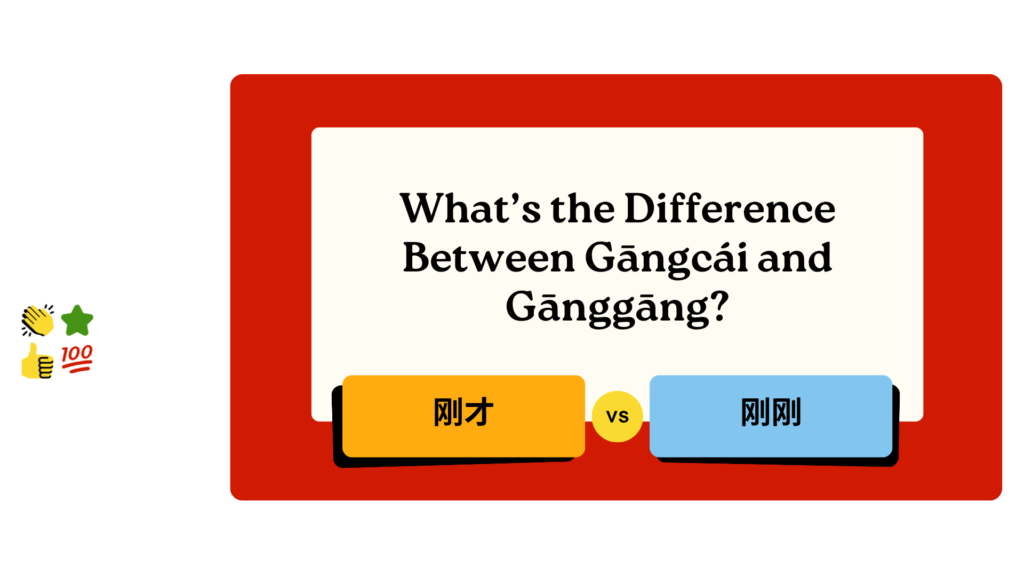To English speakers, both “刚才 (gāngcái)” and “刚刚 (gānggāng)” seem to mean “just now” or “a moment ago.”
However, in Chinese, these two words differ subtly in time reference, emotion, grammar, and tone.
Understanding this distinction will help you express time more naturally — and sound like a true native speaker.
Meaning and Core Concept
“Gāngcái” (刚才) — A Definite Moment in the Immediate Past
“刚才” refers to a specific point in the recent past, usually within minutes ago.
It’s objective and factual, used for actions that are already completed.
Common English equivalents: just now, a moment ago.
Examples:
- 我刚才去超市了。(I just went to the supermarket.)
- 刚才是谁打的电话?(Who called just now?)
🕒 “刚才” points to a finished, definite moment.
“Gānggāng” (刚刚) — A Sense of Recency and Ongoing Freshness
“刚刚” means just or just recently, but it suggests that something happened so recently that it still feels present.
It sounds more subjective and emotional, and is more common in spoken Chinese.
Common English equivalents: just, only just, just recently.
Examples:
- 我刚刚到家。(I just got home. — and I’m still here now.)
- 她刚刚哭过。(She just cried. — her eyes may still be red.)
💫 “刚刚” bridges the past and present — the event still lingers.
Time Logic and Perspective
“Gāngcái” — Completed and Clear-Cut
“刚才” marks a finished action.
It cannot be used with negation (没) or future tense.
Correct:
- 我刚才看见他了。(I saw him just now.)
Incorrect: - ❌ 我没刚才看见他。
“Gānggāng” — Flexible and Continuous
“刚刚” can describe a very recent action, whether it’s complete or still relevant.
It works with both affirmative and negative forms.
Examples:
- 我刚刚看到他。(I just saw him.)
- 我刚刚没看到他。(I didn’t see him just now.)
Emotional Tone and Usage
“Gāngcái” — Neutral and Objective
Used for recounting facts or describing events already over.
Common in both spoken and formal writing.
Example:
- 刚才开会的时候,经理提到了这个问题。(During the meeting just now, the manager mentioned this issue.)
“Gānggāng” — Soft and Conversational
Adds warmth, immediacy, or emotion to the sentence.
Common in everyday conversation and storytelling.
Example:
- 我刚刚在想你呢。(I was just thinking about you.)
Grammatical Nature: Adjective vs. Adverb
Here lies a fundamental difference that affects how both words are used:
“Gāngcái” (刚才) — Functions as a Noun-like Time Word
- It refers to a specific point in time and can act as the subject or object in a sentence.
- You can say:
- 刚才的事情很奇怪。(What happened just now was strange.)
- 刚才是我打的电话。(It was me who called just now.)
In this sense, “刚才” behaves more like a time noun (or sometimes adjective when modifying another noun).
“Gānggāng” (刚刚) — Functions as a Pure Adverb
- It only modifies verbs or adjectives, never acts as a subject or object.
- You can say:
- 我刚刚打电话给他。(I just called him.)
- But you cannot say:
- ❌ 刚刚的事情很奇怪。 (should be “刚才的事情”).
“刚刚” always describes how recently an action occurred — not the time itself.
Grammatical and Structural Differences
Sentence Position
- “刚才” often appears at the beginning of a sentence.
- “刚刚” usually comes before the verb.
Example Comparison:
- 刚才下雨了。(It rained just now. — over.)
- 刚刚下过雨。(It just rained. — still smells fresh.)
Common Collocations
| Expression | Common Combinations | Example |
|---|---|---|
| 刚才 | 去 / 来 / 说 / 打电话 / 的事情 | 刚才你去哪儿了?(Where did you go just now?) |
| 刚刚 | 到 / 做完 / 想到 / 回来 | 我刚刚想到一个主意。(I just thought of an idea.) |
Cultural and Linguistic Insight
In Chinese, the concept of “recentness” involves both time and feeling.
“刚才” reflects a finished event — distant in the speaker’s mental space.
“刚刚” feels alive, as if the moment still breathes in the present.
This subtle distinction mirrors how Chinese blends temporal logic with emotional perception — not only when something happened, but how close it still feels.
Quick Comparison Table
| Word | Core Meaning | Time Focus | Tone | Grammar | Example |
|---|---|---|---|---|---|
| 刚才 | definite, completed time | past (ended) | neutral | noun-like time word | 刚才是谁打的电话? |
| 刚刚 | recent, ongoing freshness | recent-present | emotional | adverb | 我刚刚到家。 |
Summary
In short:
- Use 刚才 (gāngcái) when referring to a specific, finished moment — it acts like a time noun.
- Use 刚刚 (gānggāng) when emphasizing recency or freshness — it works as an adverb.
Once you master this balance between time and tone, your Chinese will sound precise, natural, and intuitively timed — just like a native speaker’s.
